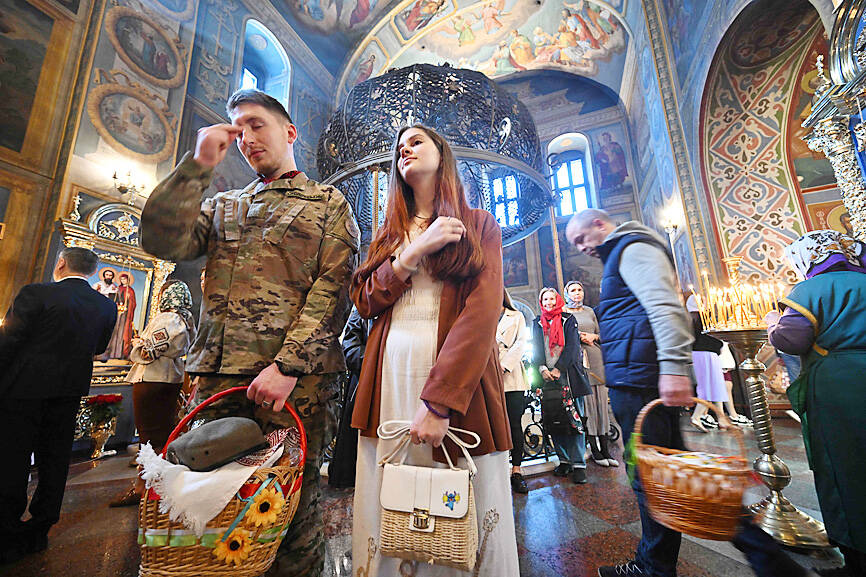Ukrainian President Volodymyr Zelenskiy yesterday said Russian forces were continuing their shelling and assaults along the front line despite Russian President Vladimir Putin announcing a surprise but brief Easter truce.
The 30-hour truce would be the most significant pause in the fighting throughout the three-year conflict.
However, just hours after the order was meant to have come into effect, air-raid sirens sounded in Kyiv and several other Ukrainian regions, with Zelenskiy accusing Russia of having maintained its attacks.

Photo: AFP
“Across various frontline directions, there have already been 59 cases of Russian shelling and five assaults by Russian units,” Zelenskiy said on social media, citing a report as of 6am from Ukrainian Armed Forces Commander-in-Chief Oleksandr Syrsky.
In the six hours up to midnight on Saturday, there were “387 instances of shelling and 19 assaults by Russian forces,” with drones “used by Russians 290 times,” Zelenskiy said.
“Overall, as of Easter morning, we can state that the Russian army is attempting to create the general impression of a ceasefire, while in some areas still continuing isolated attempts to advance and inflict losses on Ukraine,” Zelenskiy’s post said.
Putin’s order to halt all combat over the Easter weekend came after months of efforts by US President Donald Trump to get Moscow and Kyiv to agree a ceasefire.
On Friday, Washington even threatened to withdraw from talks if no progress was made.
“Today [Saturday] from 6pm to midnight Sunday, the Russian side announces an Easter truce,” Putin said in televised comments during a meeting with Russian Chief of the General Staff Valery Gerasimov.
Zelenskiy responded by saying Ukraine would follow suit, and proposed extending the truce beyond yesterday, despite accusing Russia of having already broken its promises.
“Russia must fully comply with the conditions of the ceasefire. Ukraine’s proposal to implement and extend the ceasefire for 30 days after midnight tonight remains on the table,” Zelenskiy’s post said.
Earlier he suggested that “30 days could give peace a chance” — while pointing out that Putin had already rejected a proposed 30-day full and unconditional ceasefire.
Putin had said the truce for the Easter holiday celebrated yesterday was motivated by “humanitarian reasons.”
While he expected Ukraine to comply, he said that Russian troops “must be ready to resist possible breaches of the truce and provocations by the enemy.”
Putin said the latest truce proposal would show “how sincere is the Kyiv’s regime’s readiness, its desire and ability to observe agreements and participate in a process of peace talks.”
Russia launched its full-scale invasion of neighboring Ukraine in February 2022.
Previous attempts at holding ceasefires for Easter in April 2022 and Orthodox Christmas in January 2023 were not implemented after both sides failed to agree on them.
On Saturday, Ukraine and Russia said they had each returned 246 soldiers being held as prisoners of war in a swap mediated by the United Arab Emirates.

FREEDOM OF NAVIGATION: The UK would continue to reinforce ties with Taiwan ‘in a wide range of areas’ as a part of a ‘strong unofficial relationship,’ a paper said The UK plans to conduct more freedom of navigation operations in the Taiwan Strait and the South China Sea, British Secretary of State for Foreign, Commonwealth and Development Affairs David Lammy told the British House of Commons on Tuesday. British Member of Parliament Desmond Swayne said that the Royal Navy’s HMS Spey had passed through the Taiwan Strait “in pursuit of vital international freedom of navigation in the South China Sea.” Swayne asked Lammy whether he agreed that it was “proper and lawful” to do so, and if the UK would continue to carry out similar operations. Lammy replied “yes” to both questions. The

SECOND SPEECH: All political parties should work together to defend democracy, protect Taiwan and resist the CCP, despite their differences, the president said President William Lai (賴清德) yesterday discussed how pro-Taiwan and pro-Republic of China (ROC) groups can agree to maintain solidarity on the issue of protecting Taiwan and resisting the Chinese Communist Party (CCP). The talk, delivered last night at Taoyuan’s Hakka Youth Association, was the second in a series of 10 that Lai is scheduled to give across Taiwan. Citing Taiwanese democracy pioneer Chiang Wei-shui’s (蔣渭水) slogan that solidarity brings strength, Lai said it was a call for political parties to find consensus amid disagreements on behalf of bettering the nation. All political parties should work together to defend democracy, protect Taiwan and resist

By refusing to agree spending increases to appease US President Donald Trump, Spanish Prime Minister Pedro Sanchez threatened to derail a summit that NATO Secretary-General Mark Rutte needs to run smoothly for the sake of the military alliance’s future survival. Ahead of yesterday’s gathering in The Hague, Netherlands, things were going off the rails. European officials have expressed irritation at the spoiler role that Sanchez is playing when their No. 1 task is to line up behind a pledge to raise defense spending to 5 percent of GDP. Rutte needed to keep Spain in line while preventing others such as Slovakia

SHIFT PRIORITIES: The US should first help Taiwan respond to actions China is already taking, instead of focusing too heavily on deterring a large-scale invasion, an expert said US Air Force leaders on Thursday voiced concerns about the Chinese People’s Liberation Army’s (PLA) missile capabilities and its development of a “kill web,” and said that the US Department of Defense’s budget request for next year prioritizes bolstering defenses in the Indo-Pacific region due to the increasing threat posed by China. US experts said that a full-scale Chinese invasion of Taiwan is risky and unlikely, with Beijing more likely to pursue coercive tactics such as political warfare or blockades to achieve its goals. Senior air force and US Space Force leaders, including US Secretary of the Air Force Troy Meink and